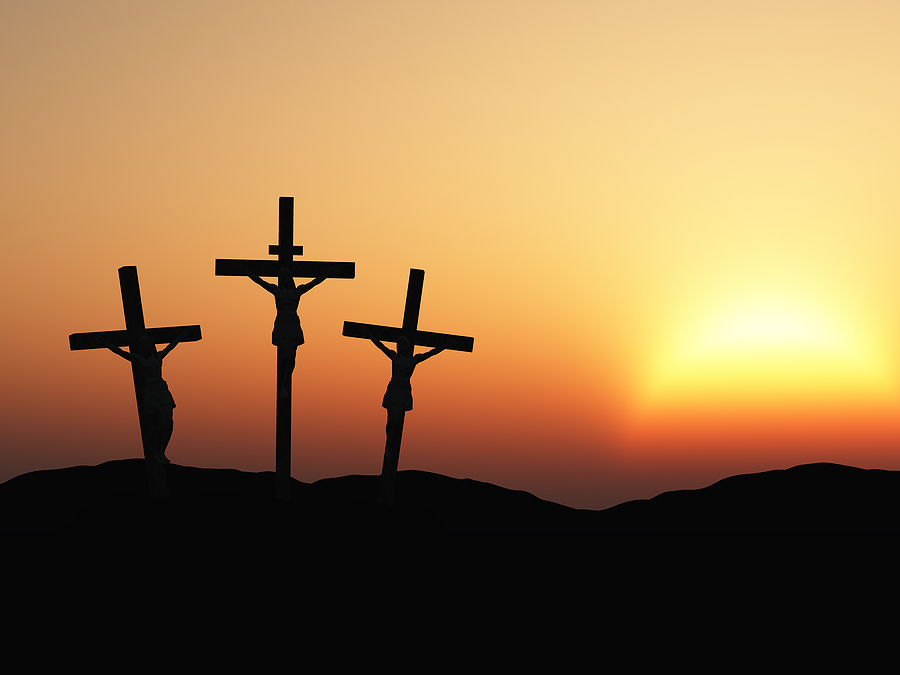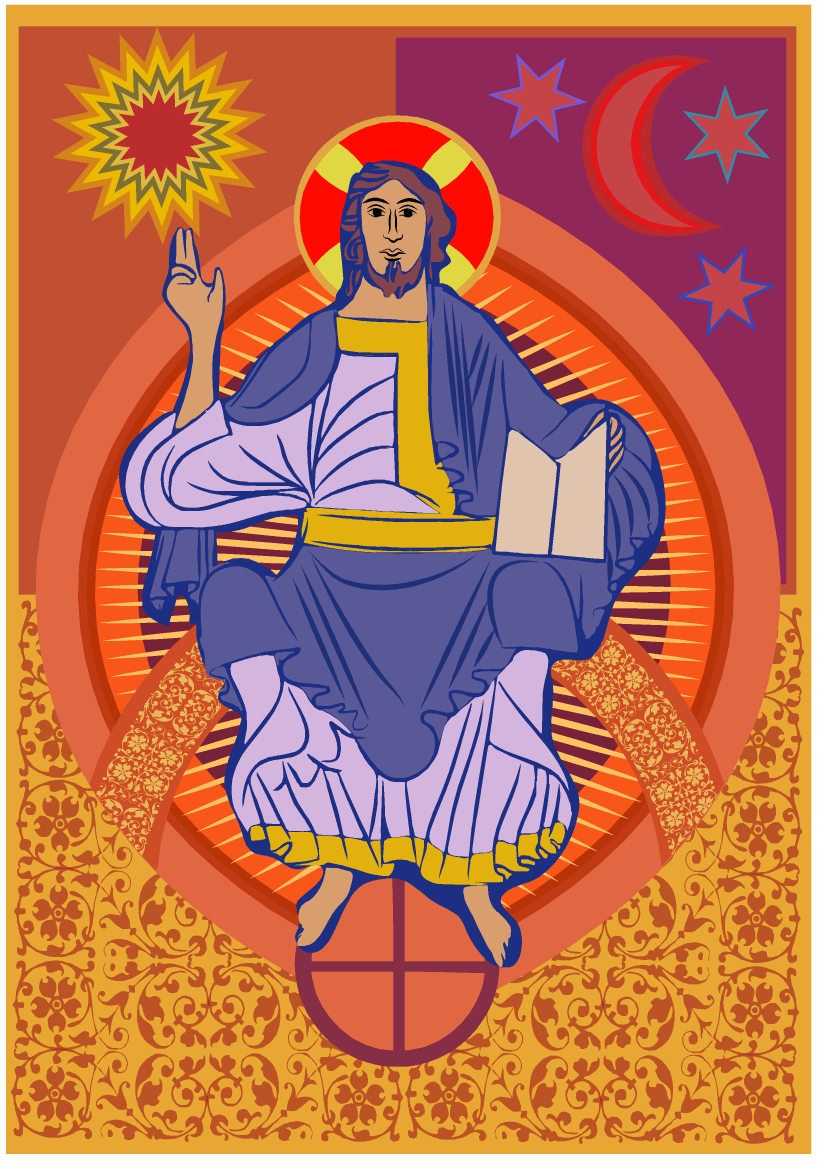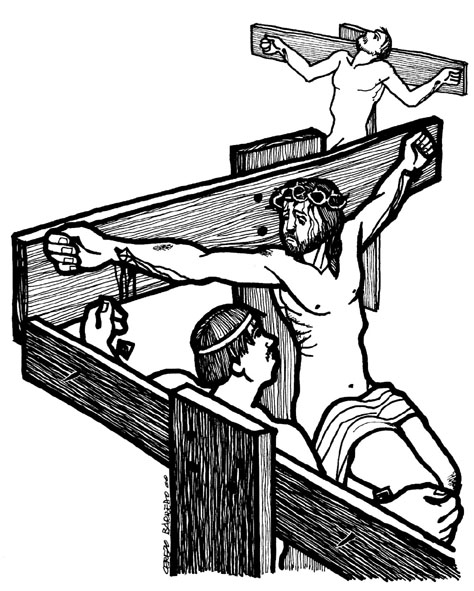There are two people to whom Jesus never responded: The so called bad thief on the cross and to Herod. Both may have been speaking on behalf of someone else. It is important to know who that is.
 Looking carefully at today’s gospel, we are going to learn two formulas that are central to our salvation or lack thereof. If we look at the scene, we can see that Jesus is between the two criminals. The first, we call the bad thief of the cross, he is manipulative, self-centered and thinks only in material, earthly terms and what will benefit him at every opportunity. So Let us look at his words: “Aren’t you the Christ, then save yourself and us”. If you are the Christ, then you are the one who has the power to free us from this Earthly suffering. You have the power to end this domination by the Romans over us. You have the power to get us off of this cross. You have the power to set me free so that I may do what I want to do.
Looking carefully at today’s gospel, we are going to learn two formulas that are central to our salvation or lack thereof. If we look at the scene, we can see that Jesus is between the two criminals. The first, we call the bad thief of the cross, he is manipulative, self-centered and thinks only in material, earthly terms and what will benefit him at every opportunity. So Let us look at his words: “Aren’t you the Christ, then save yourself and us”. If you are the Christ, then you are the one who has the power to free us from this Earthly suffering. You have the power to end this domination by the Romans over us. You have the power to get us off of this cross. You have the power to set me free so that I may do what I want to do.
Look carefully at these words: There is a formula here. If you are the Christ then you can prove it by acting in the manner that I request. The leaders of the people do the same. Here is the test. If you are the Christ, this is how you will act. This defines the conditions on which they will believe.
Let us look at the other criminal for a second. After his rebuking the first thief, he then asks for God’s mercy. He too recognizes Jesus as Christ, and as King, but his words are otherworldly, “remember me when you enter into your Kingdom.”
Now, let us look closely at the scene. The leaders of the people and the bad thief of the cross are all screaming the same thing. If you are the Messiah, then you will get yourself off the cross. The sign of his presence is that he will act within their expectations and then they will believe.
The Good thief on the cross says something different. I believe you are the Christ, I am not worthy to be in your presence. I seek your mercy for my sins. Please have mercy on me.
The former attitude leads to condemnation, the latter to salvation.
Let us look at it these attitudes when we see them elsewhere. What is it that the Devil says to Jesus: If you are the Son of God, then you will turn these rocks into bread. It is the same formula. What you are seeing in the bad thief on the cross and in the leaders of the people is the devil manifesting himself through them for his latest temptation. Imagine the suffering he undergoes and the opportunity He has to not only free himself, but also to glorify Himself in a way that leaves everyone speachless and leads them to bow down to him. This entire temptation Jesus rejects.
Now to good thief. Notice again the formula, recognizing Jesus as Messiah, the person then realizing in his sinfulness that he is not worthy to even be in his presence and seeks his mercy.
Where do we see it elsewhere. St. Peter, his first words to Jesus are for Him to leave for he is a sinful man. Mary Magdalene washes Jesus’ feet with her tears and cleans them with her hair. So many others who are healed or who intercede for the healing of a loved one. Often, there is a recognition of the reality of Jesus and some form of recognition of one’s own sinfulness when in His presence while seeking His mercy.
Let us look at these words around us:
Let us look first at that of the good thief on the cross. If the formula of his words look familiar, they should, they fit every mass. We begin by declaring our sinfulness and then we walk into the presence of God.
Yet the opposite formula is also present it is often around us.
How many times have you heard people define the Catholic Church as out of touch. People who will tell you that they will embrace Catholicism when it matches their idea of how a Christian faith should be. When the Catholic Church updates itself, when it allows women priests, gay marriage, abortion, euthanasia, embryonic stem cell research, pre-marital sex. The list continues. Each one says that I will embrace Christ, when Christ matches my idea of what the Messiah should be. We are surrounded by that attitude.
Now, look at Christ. He is surrounded by those screaming the same thing, using the same formula. There are three people we can name who are using the formula of salvation: The good thief on the cross, Mary and John.
Do you recognize Jesus Christ. Will you accept him as the Messiah or are you waiting to put some conditions on his Messiahship.
Notice in no case are those who are sinners condemned for being sinners, only those who define Jesus Messiahship as allowing them to pursue their sinful ways. Those who recognize their sinful ways but seek his grace in following Him are saved.
Messiahship as allowing them to pursue their sinful ways. Those who recognize their sinful ways but seek his grace in following Him are saved.
You and I always have the choice, repent or rationalize. Admit that we are sinners or explain away our sins. One way leads to salvation the other to condemnation. Yet, remember, the number of those who seek the latter method are legion. If you choose the former, prepare to not only be in the minority, but be prepared to be at emnity with those who disagree with us.
The bad thief on the cross and Herod have the unique distinction of being the only two people who spoke to Jesus to whom Jesus never replied. That should not surprise us. Those in deliverance ministry teach an important aspect. In either case, there are only two things one should ever say to a demonic presence: What is your name? and When are you leaving? No more. Jesus had nothing to say to Herod and the Bad thief because both were channelling the demonic. He had nothing to say to them and they had no desire for salvation. They had made their respective choice and it was not for salvation.
When people using the formula “I will walk into a Catholic Church when she conforms myself to what I say.” Do not dismiss the idea that their ultimate goal is not their belief but undermining yours. The good thief on the cross, despite his sinful ways, was saved that day. Scripture says nothing more of whatever happened to the bad thief or to Herod (yes I know he became a friend of Pilate, but that passage precedes this one.) However, I don’t think they partied with Jesus in paradise in the near nor distant future.
God bless you,
Fr. Robert J Carr
Fr. Carr is an alliance member of the New Song Community (Canção Nova). He is the pastor of St. Benedict Parish in Somerville, MA and is the editor of this blog. He is also the author of a blog directed specifically to priests. That can be found at thesacramentallife.blogspot.com
photo credit
Top: Galdzer via Bigstockphoto.com
Middle and Bottom: Hermano Leon

